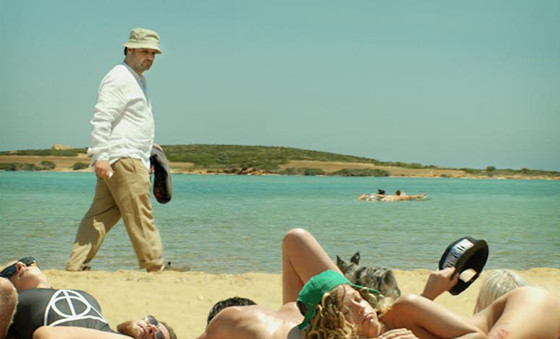
Suntan is the third feature film after Bank Bag (2008) and Wasted Youth (2011) from Greek director Argyris Papadimitropoulos, and it’s a dark doozy.
Kostis (Efthymis Papadimitriou) is a 42-year-old doctor who has just arrived at Antiparos, a Cycladic Greek island with a winter population hovering around 800 folks. Disembarking from the ferry, he’s the sole occupant, a fatalistic gloom seems to veil him and as he takes up residence as the new doctor it seems apparent that Kostis has some kind of social anxiety, and perhaps some emotional trauma from not too long ago, also.
During the first act of the film, before summer and sunshine finds Antiparos, Papadimitropoulos and his skilled cinematographer Christos Karamanis detail a feeling of brisk distance and icy ennui, with the color blue too prevalent, even Kostis pathetic Christmas tree with blinking lights offer no hospitality, except perhaps ironically so.
With summer the color palette on Antiparos expands, and Kostis’ little clinic is much busier with island visitors and sightseers. It’s here that he meets a group of young hedonistic tourists and one in particular, 19-year-old Anna (Elli Triggou).
Anna, injured from a drunken accident on her ATV four wheeler, has Kostis dress her flesh wound as her and her obnoxious friends crowd the doctor, flirting and jesting and inviting him to join them for some beers on the beach. It soon becomes apparent that Anna has aroused something in Kostis and at first their dalliance, and Kostis’ ogling, while uncomfortable, seems light-hearted.
As Suntan saunters ever forward Papadimitropoulos offers more and more an uncompromising portrait of one lonely man’s descent into an uncomfortable and increasingly embarrassing eddy of desire and lust.
Anna, often egged by her annoying and hard-partying pals, allows Kostis much access to her, her hell raising, and her camarilla. He’s with them as they skinny dip, guzzle booze, go clubbing, raise the roof, and make out. Before too long they’ve shared certain intimacies and Kostis’ professional life and personal life, already frail and fishy, starts to fray.
At times Suntan seems to suggest it wants to be an unsettling comedy but its black heart suggests something closer to horror. It might just be that given so many thoroughly unlikable thrill-seekers who party and do little else, and given a protagonist that’s so aloof and unresponsive that audiences won’t fully be able to engage with Papadimitropoulos’ curiously constructed film.
Ultimately a tragedy, the ambiguous ending, while artfully framed, is perhaps too opaque and pessimistic to have the significance it should. Suntan is a somber and somewhat excruciating film of attraction and misconception with lovely scenery blighted by too much misanthropy.
Taste of Cinema Rating: 3.5 stars (out of 5)
Author Bio: Shane Scott-Travis is a film critic, screenwriter, comic book author/illustrator and cineaste. Currently residing in Vancouver, Canada, Shane can often be found at the cinema, the dog park, or off in a corner someplace, paraphrasing Groucho Marx. Follow Shane on Twitter @ShaneScottravis.